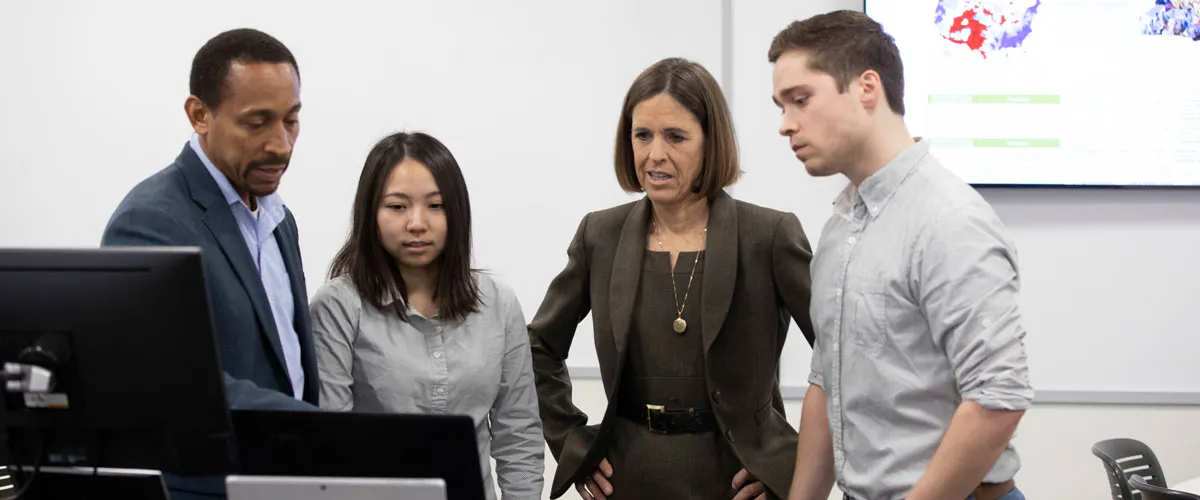$1.2 million grant to prepare a diverse group of secondary mathematics and science teachers
A five-year, $1.2 million grant from the National Science Foundation's Robert Noyce Teacher Scholarship Program will bring together faculty from the UGA Mary Frances Early College of Education, the Franklin College of Arts and Sciences and the College of Engineering to recruit and prepare a diverse group of secondary mathematics and science educators to teach in northeast Georgia schools.
Guided by an ongoing STEM collaboration, the goal of the Georgia Educators in Mathematics and Science (GEMS) project is to prepare 34 teachers over five years in STEM fields ranging from biology, chemistry and physics to mathematics and engineering. Students in the program will receive $18,000 to cover room and board and the cost of tuition while pursuing their master's degree in teaching.
"Each year, bright, engaged and culturally aware students pursue STEM degrees at the University of Georgia, and most of them are unaware of the details of a career in secondary science or mathematics education," said Paula Lemons, professor of biology education, biochemistry and molecular biology and co-investigator of the project. "We are planning on reaching these university students, so they can lead Georgia middle and high school students toward STEM careers."
UGA STEM students interested in exploring science or mathematics education as a career can participate in paid internships in the Clarke County School District led by associate professor Kevin Burke and professor Ruth Harman in the department of language and literacy education. Students will also engage in peer-learning assistant opportunities and classes that explore K-12 teaching in local schools.
"Once UGA STEM students are in the Noyce program and become scholars, we really want to ensure their instructional practices are strengthened and then sustained after graduation," said Julie Luft, Athletic Association Professor of Mathematics and Science Education and principal investigator of the project. "In the program, we will emphasize working in diverse settings and enacting the state mathematics and science standards."
Currently, secondary mathematics and science teacher education programs in the College of Education are content-focused and contain field experiences in high-need partner schools. The GEMS project seeks to enhance these current programs by creating more connections with the STEM field and by increasing instruction on equity and inclusion.
"Diversity empowers societies to tap into spectra of minds, perspectives and talents that would otherwise be lost where homogeneity prevails," said Nathaniel Hunsu, assistant professor of engineering education and co-principal investigator of the project. "Science and technology thrive on innovation, and the profoundness of such innovations will depend on the richness of our diverse minds."
To ensure scholars' future success, Luft—who was named a UGA 2020 Distinguished Research Professor—and a graduate student on the project will develop a hybrid induction program to support newly hired teachers from the project during their first year of teaching. The induction program provides subject-specific support that focuses on diversity and the state standards to continually strengthen and support scholars' teaching and instruction.
"When science and mathematics teachers are prepared, they have a lot of opportunity to engage with experts, but when they begin their careers, they are missing some of this support from their teacher education programs," said Luft. "So, by connecting them back to their teacher education program, we're trying to make sure our scholars are fortified and can continue building their expertise as science or mathematics educators."
The research component of the project will contribute to the field's existing literature on recruitment, teacher preparation and the induction of scholars.
Undergraduates who have attained at least junior status in a STEM bachelor's program and graduate students who hold degrees in a STEM area are eligible to apply for the GEMS Noyce scholarship. Both groups should have early field experiences, including internships that indicate their interest for working in diverse high-need schools.
Prospective scholars can complete the GEMS Noyce Fellowship application by October 1, 2020 for spring admission or March 1 for fall admission. The first group of GEMS scholars will start their training this fall.
Other members on the project include professor and co-PI Dorothy White in the Mary Frances Early College of Education; associate research scientist and project manager Georgia Hodges in the College of Education; clinical assistant professor and project manager Kelly Edenfield in the College of Education; and doctoral students Austin Heil and Elgin Leary in the College of Education.
